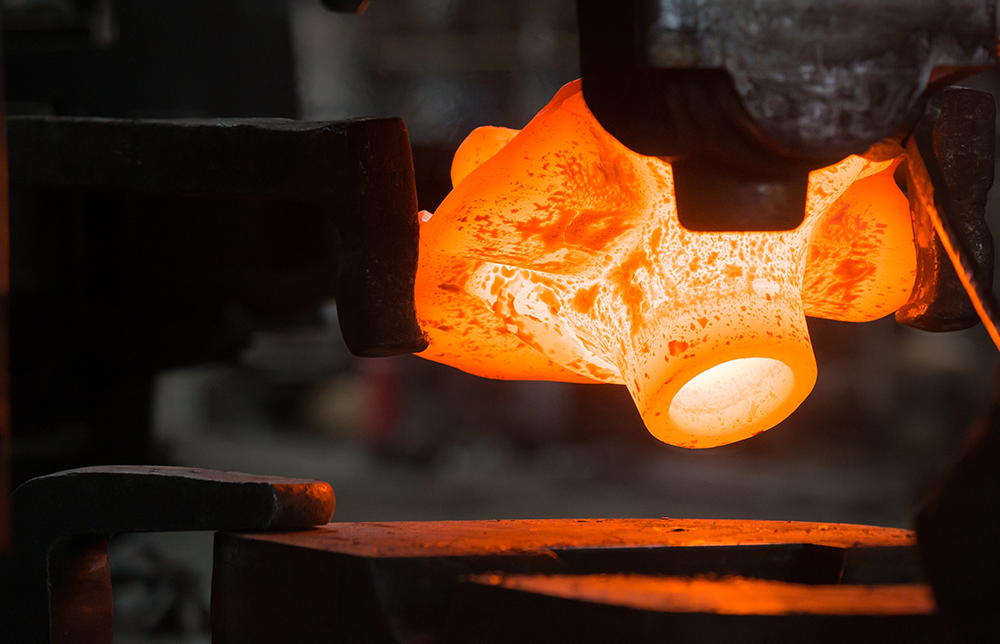Understanding Material Choices in Forging
The art of forging has been a cornerstone of manufacturing for centuries, playing a vital role in industries ranging from transportation and aerospace to construction and heavy machinery. Through the strategic application of heat and immense pressure, raw metals are expertly shaped into high-performance, durable components that form the backbone of countless critical applications.
Yet, the true mark of excellence in forging lies beyond the process itself—it’s found in the careful and informed selection of materials. The right choice of metal can significantly impact the performance, longevity, and safety of the forged parts, making material selection one of the most crucial decisions in the forging industry. At Canton Drop Forge, we combine decades of expertise with state-of-the-art forging technology to ensure that every forged product meets the rigorous demands of modern industry.
As a trusted leader in the forging industry, Canton Drop Forge understands that the key to delivering superior, reliable products lies not only in our precision-driven processes but also in selecting the ideal metal that aligns with the specific needs of each application. Whether it’s alloy steel for high-strength performance or stainless steel for corrosion resistance, we are committed to using the best materials to create forged components that exceed industry standards and customer expectations.

The Role of Material Choice in Forging
Selecting the appropriate material for forging is essential to achieving the desired performance and longevity of the final product. Each metal offers distinct characteristics—such as tensile strength, corrosion resistance, and malleability—that make it ideal for specific uses. In industries like aerospace, transportation, and construction, where components are often subjected to extreme conditions, the wrong material choice could lead to reduced efficiency, unexpected breakdowns, or even critical safety failures. Therefore, careful consideration of material properties is vital to ensure that forged parts can withstand the operational demands they will face, preventing costly downtime and ensuring safety.
Key Material Categories in Forging
At Canton Drop Forge, we specialize in forging a variety of materials, each with its own set of characteristics that make it suitable for different applications. Below, we dive into some of the most common materials we work with and explain why they are selected for particular industries:
Carbon and Alloy Steels
Carbon and alloy steels are the most widely used materials in the forging industry due to their combination of strength, toughness, and wear resistance. Carbon steels are often chosen for parts that require hardness and high durability, such as gears and shafts. Alloy steels, on the other hand, can be tailored with elements like chromium, nickel, and molybdenum to enhance strength and resistance to wear and fatigue.
Stainless Steels
Known for their corrosion resistance, stainless steels are often used in industries that require long-lasting performance in harsh environments, such as chemical processing and food production. Canton Drop Forge specializes in forging stainless steel components that meet rigorous standards for cleanliness and durability.
Tool Steels
Tool steels, known for their ability to retain hardness at high temperatures, are vital for components that experience high stress during operation, such as cutting tools and dies. The durability and wear resistance of tool steels make them a preferred choice in industries where long-lasting precision is required.
Non-Ferrous Metals
Non-ferrous metals also play a critical role in modern forging applications. They are prized for their strength-to-weight ratio and corrosion resistance, and are frequently used in high-performance applications, such as aircraft components and medical implants.
Comparing Forging Materials
Each material brings unique benefits, and the choice ultimately depends on the specific demands of the application.
Here’s a quick comparison of the materials Canton Drop Forge works with:
| Material | Properties | Ideal Applications |
| Carbon Steel | Strong, tough, economical | Automotive components, Machinery parts |
| Alloy Steel | Tailored properties for strength and durability | Aerospace, Oil & Gas |
| Stainless Steel | Corrosion-resistant, high-strength | Food processing, Chemical plants |
This comprehensive approach to material selection ensures that every forged product meets the
exact standards required by our customers.
The Forging Process at Canton Drop Forge
At Canton Drop Forge, our forging process is meticulously designed to ensure both material efficiency and exceptional product integrity, meeting the highest standards in the industry. We understand that each project has unique demands, and to address these, we take a collaborative approach from the very beginning.
Our commitment to delivering the best long-term value means that we don’t just provide a product—we deliver a solution that is built to last, optimized for efficiency, and tailored to meet the ever-evolving needs of industries such as aerospace, automotive, oil and gas, and construction. At Canton Drop Forge, every step of our forging process is a testament to our dedication to quality, precision, and innovation.
The Bottom Line: Forging Excellence Through Expert Material Selection
Material selection is an art that blends science, experience, and innovation. At Canton Drop Forge, we pride ourselves on choosing the right materials to ensure that every forged component meets the highest standards of quality and performance. Whether it’s carbon steel for automotive parts or stainless steel for food processing equipment, our material choices are informed by decades of experience and a commitment to excellence.
By understanding the unique properties of different forging materials, our clients can make informed decisions that lead to longer-lasting, more reliable products. Canton Drop Forge stands ready to assist in that process, ensuring that every component we produce is a testament to the metallurgy of excellence.
Ready to learn more about how material choices can impact your forging projects? Contact Canton Drop Forge today to discuss your needs and discover how our expertise can benefit your operations.
